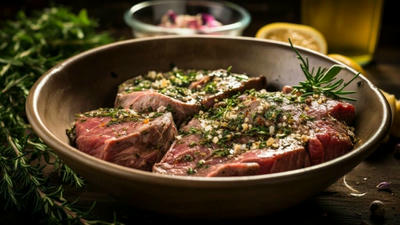
Marinating is one of the most effective ways to infuse flavor into meats, ensuring that every bite is tender and delicious. While traditional marination practices can take hours or even overnight, quick marination techniques offer a way to achieve incredible flavor in a fraction of the time.
Marination is the process of soaking meat in a seasoned liquid before cooking. This process deepens the flavor profile of the meat and can help tenderize tougher cuts. Marinating works through two primary mechanisms: flavor absorption and the chemical breakdown of proteins.
Flavor Absorption: When meat is placed in a marinade, it absorbs the flavors from the liquids and spices. This absorption is enhanced by time, temperature, and the chemical composition of the marinade.
Protein Breakdown: Acidic components in many marinades, such as vinegar, citrus juice, or yogurt, can help break down proteins in meat. This process, known as denaturation, tenderizes the meat and allows flavors to penetrate more deeply.
Quick marination offers several advantages that make it an appealing choice for home cooks:
Time Efficiency: Quick marinades can be prepared and used in as little as 30 minutes to 2 hours, making them perfect for weekday dinners or last-minute meal prep.
Enhanced Flavor: With the right balance of ingredients, quick marinades can impart intense flavors without the need for long soaking times.
Versatility: Quick marination techniques can be applied to a variety of meats, including chicken, beef, pork, and seafood, making it a flexible option for different meals.
Healthier Cooking: Quick marinades can enhance the taste of lean meats, encouraging the consumption of healthier protein options.

Creating a flavorful quick marinade requires understanding its basic components. Here are the key ingredients you need:
Acid is a crucial element in any marinade, as it tenderizes the meat and enhances flavor. Common acidic ingredients include:
Fat helps to enhance the marinated meat's flavor while also aiding moisture retention during cooking. Ideal fats include:
In addition to acid and fat, you can build flavor with various herbs, spices, and aromatics:
Adding a touch of sweetness can help balance acidity and enhance caramelization during cooking. Common sweeteners include:
While marinating can be a straightforward process, employing the right tools can make it even easier:
Use mixing bowls to combine marinade ingredients. Non-reactive bowls (glass or stainless steel) are ideal, as they won't react with acidic components.
A whisk or fork can help to emulsify the marinade, creating a smooth mixture that evenly coats the meat.
For meats that need to absorb flavor quickly, consider using a marinade injector to inject the marinade directly into the meat, enhancing flavor penetration.
Resistant to leaks, zip-top bags allow for even marination. They also enable the option to “massage” the marinade into the meat.
A container with a tight-fitting lid can contain the meat and marinade together, reducing the risk of spillage.
Investing in a reliable cooking thermometer is essential for checking the doneness of your marinated meats, ensuring they are cooked perfectly.

While traditional marination typically requires hours, several techniques can speed up the process. Here are some quick marination strategies to consider:
Using zip-top bags allows for efficient marination. The vacuum effect created by pressing out air encourages better absorption of flavors.
Using salt with quick methods can enhance flavor quickly. Also known as a dry brine, this method helps tenderize the meat and draws out moisture:
When marinating, warming the marinade slightly can expedite flavor absorption. This technique works especially well when using flavors that are naturally resistant to heat.
Using a marinade injector allows you to inject flavors deep into the meat, speeding up the absorption process:
Once you understand the fundamental components of a marinade and how to use them effectively, you can mix and match ingredients to create a range of flavorful marinades. Here are several quick marinade recipes for different types of meat:
Ingredients:
Instructions:
Ingredients:
Instructions:
Ingredients:
Instructions:
Ingredients:
Instructions:
Ingredients:
Instructions:

After marinating, it’s time to cook your meats. Here are some tips for cooking marinated meats to perfection:
Before cooking, remove the meat from the marinade and let any excess liquid drip off. For a deeper sear, pat the meat dry with paper towels. However, you can reserve some marinade for glazing or basing during cooking, ensuring it is boiled first to eliminate any harmful bacteria.
High heat is key to achieving a delicious sear on your meat. Whether you are grilling, pan-searing, or roasting, ensure that your cooking surface is hot before adding the meat.
Cook marinated meats according to their thickness and type. Using a cooking thermometer can help you ensure your meat reaches the proper internal temperature:
After cooking, let your meat rest for a few minutes. Resting allows the juices to redistribute, yielding a more tender and flavorful dish.
Even with the best intentions, things can go awry. Here’s how to troubleshoot common marination problems:
If your meat turns out too salty, consider balancing it by slicing it thinly and serving it over something neutral, like rice or a salad. The extra ingredients can dilute the saltiness.
If you marinated for too long, particularly with acidic marinades, the meat may turn mushy. To avoid future issues, watch timing closely.
If the flavors are muted after cooking, consider a more concentrated marinade or bumping up seasoning amounts, including salt and aromatics.
Marinades are not only for soaking meat; they can also be utilized in various creative ways:
Quick marination techniques empower home cooks to create flavorful and tender meats rapidly, enriching everyday meals with delicious flavors. Using the right combination of ingredients, tools, and techniques can make this process straightforward and effective.
With a bit of knowledge and practice, you can elevate your culinary skills by mastering quick marination. Explore various flavors and pairings to find what works best for you, keeping your meals exciting and satisfying.
Don't shy away from experimenting with different marinades, and remember that the key to success is balancing flavors while allowing enough time for the meat to absorb them. With this guide, you can confidently marinate your way to magnificent meals that your family and friends will love.